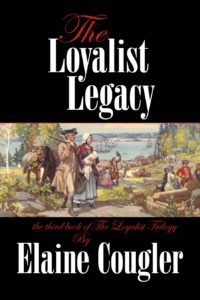The whole point of historical fiction is to tell a story. And every story has two sides, unless it’s your side and then the other side’s uh, side, is apparently invalid. Sometimes this gets contentious (those of you who missed the point of my last post and thought I was a Castro apologist need to breathe.) So let’s take the most calm, polite example I can think of: the Loyalists who built Southern Ontario after the cruel terrorists forced them from their lawful land in America…. oh did that hurt? #sorrynotsorry.
Fact is, that the American revolution didn’t end in 1778, and the “other side” weren’t all animal brutes and Hessians hired to oppress the good people of the colonies. Elaine Cougler has done yeoman service in her “Loyalist Trilogy,” and I interview her here.
So, here’s the Elaine story in a nutshell…
Elaine Cougler is the author of historical novels about the lives of settlers in the Thirteen Colonies who remained loyal to Britain during the American Revolution. She uses the backdrop of the conflict for page-turning fictional tales where the main characters face torn loyalties, danger and personal conflicts.
the Thirteen Colonies who remained loyal to Britain during the American Revolution. She uses the backdrop of the conflict for page-turning fictional tales where the main characters face torn loyalties, danger and personal conflicts.
Her Loyalist trilogy: The Loyalist’s Wife, The Loyalist’s Luck and The Loyalist Legacy came out this month. The Inspire! Toronto International Book Fair selected The Loyalist’s Wife as a finalist in its Self-Publishing Awards. The Middlesex County Library selected the book as its choice for book club suggestions. The Writers Community of Durham Region presented Elaine with a Pay-It-Forward Award.
Alright, so this is the third book in the series. What’s it about?
The Loyalist Legacy plunks the Garner family right in the wild heart of Upper Canada (now southern Ontario) to build a life after their devastating losses in Niagara. They’ve suffered through the American Revolutionary War (The Loyalist’s Wife) and the War of 1812 (The Loyalist’s Luck) and now settle on two hundred acres awarded them by the Crown for military service. All they want is peace and prosperity. Instead they find extreme hardship, back-destroying labor, disgruntled native peoples, family feuds and a government where they have no say and must watch as the “Family Compact” keeps power and position in the hands of a privileged few. This last becomes the divisive knife that leads the settlers ever closer to rebellion. Perhaps Upper and Lower Canada will take the path their neighbours to the south have taken.
What’s your interest in that time period?
I have in my possession a book about Butler’s Rangers, a famous group of militia who fought for the King in the Revolutionary War, and in the back are the names of two of my relatives, John Cain and John Garner. That absolutely got my attention even though there is some question about whether the second one is actually my John Garner ancestor. My brain took off on all the possibilities and mapped out a fictional story for John Garner set against the history of the times after the Boston Tea Party, the resettling after the Revolutionary War (where did all those disgruntled people go?) and the War of 1812. Once I was into the initial research more and more nuggets seemed to drop into my head leading to not just one novel but a trilogy. My brother and his wife shared their findings of the family history and took me on a car tour to the actual land where William and Catherine (Cain) Garner settled north of London, Ontario. I could just see the third book as I gazed out at the two hundred acres on either side of the Thames River and the place where the Garners had built their home. How in the world did they do it?
Without giving away spoilers, what’s your favorite scene?
 I have so many. There is one involving Catherine Garner and her ability to rise up and fight against a lynx that has come right up on her porch and grabbed a papoose from its cradle there. There is another where she is furious with William because of his treatment of his brother and in a flash of insight switches to empathy for the man she loves. I love the strength of Migisi and Kiwidinok, a Chippewa couple who represent the plight of the native peoples at this time in our North American history. And I love the scene from Lucy’s point of view at her granddaughter’s wedding and its subsequent denouement. All of these scenes and many more show the strength of these ordinary people who when circumstances demand become absolutely extraordinary. These are the ancestors of many of us lucky enough to live here now in North America.
I have so many. There is one involving Catherine Garner and her ability to rise up and fight against a lynx that has come right up on her porch and grabbed a papoose from its cradle there. There is another where she is furious with William because of his treatment of his brother and in a flash of insight switches to empathy for the man she loves. I love the strength of Migisi and Kiwidinok, a Chippewa couple who represent the plight of the native peoples at this time in our North American history. And I love the scene from Lucy’s point of view at her granddaughter’s wedding and its subsequent denouement. All of these scenes and many more show the strength of these ordinary people who when circumstances demand become absolutely extraordinary. These are the ancestors of many of us lucky enough to live here now in North America.Twitter @ElaineCougler
